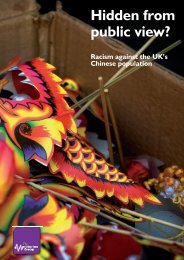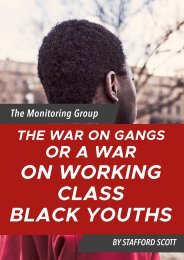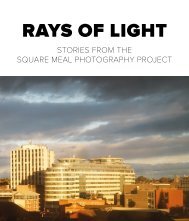Coming of Age : 1976 and the Road to Anti-Racism
Coming of Age : 1976 and the Road to Anti-Racism by Jagdish Patel and Suresh Grover
Coming of Age : 1976 and the Road to Anti-Racism
by Jagdish Patel and Suresh Grover
Create successful ePaper yourself
Turn your PDF publications into a flip-book with our unique Google optimized e-Paper software.
tute racial discrimination, <strong>and</strong> <strong>the</strong>reby provide <strong>the</strong> breeding ground for fascism, <strong>the</strong> mosaic <strong>of</strong> unities <strong>and</strong> organisations<br />
would resolve itself in<strong>to</strong> a more holistic, albeit shifting, pattern <strong>of</strong> black unity <strong>and</strong> black struggle.<br />
By 1955 <strong>the</strong> first wave <strong>of</strong> immigration had begun <strong>to</strong> taper <strong>of</strong>f: a mild recession had set in <strong>and</strong> (he dem<strong>and</strong> for<br />
labour had begun <strong>to</strong> drop (though London Transport was still recruiting skilled labour from Barbados in 1956).<br />
Left <strong>to</strong> itself, immigration from <strong>the</strong> West Indies was merely following <strong>the</strong> dem<strong>and</strong> for labour; immigration from<br />
<strong>the</strong> Indian subcontinent, especially after <strong>the</strong> restrictions placed on it by <strong>the</strong> Indian <strong>and</strong> Pakistani governments<br />
in 1955 was now more sluggish. But racialism was hotting up <strong>and</strong> <strong>the</strong>re were calls for immigration control, not<br />
least in <strong>the</strong> House <strong>of</strong> Commons. There had always been <strong>the</strong> occasional call more for political reasons than economic;<br />
now <strong>the</strong> economy provided <strong>the</strong> excuse for politics. Pressure was also building up on <strong>the</strong> right. The loss<br />
<strong>of</strong> India <strong>and</strong> <strong>the</strong> impending loss <strong>of</strong> <strong>the</strong> Caribbean <strong>and</strong> Africa had spelt <strong>the</strong> end <strong>of</strong> empire <strong>and</strong> <strong>the</strong> decline <strong>of</strong><br />
Britain as a great power. All that was left <strong>of</strong> <strong>the</strong> colonial enterprise was <strong>the</strong> ideology <strong>of</strong> racial superiority; it was<br />
something <strong>to</strong> fall back on. Mosley’s pre-war British Union <strong>of</strong> Fascists was now revived as <strong>the</strong> Union Movement<br />
<strong>and</strong> was matched for race hatred by a rash <strong>of</strong> o<strong>the</strong>r organisations: A.K. Chester<strong>to</strong>n’s League <strong>of</strong> Empire Loyalists,<br />
Colin Jordan’s White Defence League, John Bean’s National Labour Party, Andrew Fountaine’s British National<br />
Party. And in <strong>the</strong> twilight area, between <strong>the</strong>se <strong>and</strong> <strong>the</strong> right wing <strong>of</strong> <strong>the</strong> Tory Party, various societies for<br />
‘racial preservation’ were beginning <strong>to</strong> sprout. Racial attacks became a regular part <strong>of</strong> immigrant life in Britain.<br />
More serious clashes occurred intermittently in London <strong>and</strong> several provincial cities. And in 1954, in a small street<br />
<strong>of</strong> terraced houses in Camden Town [London], racial warfare was waged for two days, culminating in a petrol<br />
bomb attack on <strong>the</strong> house <strong>of</strong> a West Indian. (4) Finally, in August 1958 large-scale riots broke out in Nottingham<br />
<strong>and</strong> were soon followed in Netting Hill (London), where teddyboys, directed by <strong>the</strong> Mosleyites <strong>and</strong> <strong>the</strong> White<br />
Defence League, had for weeks gone on a jamboree <strong>of</strong> “nigger-hunting’ under <strong>the</strong> watchful eye <strong>of</strong> <strong>the</strong> police.<br />
The blacks struck back, <strong>and</strong> even moderate organisations like <strong>the</strong> Committee <strong>of</strong> African Organisations, having<br />
failed <strong>to</strong> obtain ‘adequate unbiased police protection’, pledged <strong>to</strong> organise <strong>the</strong>ir own defence. The courts, in<br />
<strong>the</strong> person <strong>of</strong> a Jewish judge, Lord Justice Salmon, made amends by sending down nine teddyboys <strong>and</strong> establishing<br />
<strong>the</strong> right <strong>of</strong> ‘everyone. irrespective <strong>of</strong> <strong>the</strong> colour <strong>of</strong> <strong>the</strong>ir skin... <strong>to</strong> walk through our streets with<br />
<strong>the</strong>ir heads erect <strong>and</strong> free from fear’. He also noted that <strong>the</strong> teddy-boys’ actions had ‘filled <strong>the</strong> whole nation<br />
with horror, indignation <strong>and</strong> disgust’. It was <strong>to</strong> prove <strong>the</strong> last time when such a claim could be made on behalf<br />
<strong>of</strong> <strong>the</strong> nation. Less than a year later a West Indian carpenter, Kelso Cochrane, was stabbed <strong>to</strong> death on<br />
<strong>the</strong> streets <strong>of</strong> Notting Hill. The police failed <strong>to</strong> find <strong>the</strong> killer. It was <strong>to</strong> prove <strong>the</strong> first <strong>of</strong> many such failures.<br />
The stage was set for immigration control. But <strong>the</strong> economy was beginning <strong>to</strong> recover <strong>and</strong> <strong>the</strong> Treasury was known<br />
<strong>to</strong> be anxious about <strong>the</strong> prospect <strong>of</strong> losing a beneficial supply <strong>of</strong> extra labour for an economy in a state <strong>of</strong> expansion —<br />
though <strong>the</strong> ongoing negotiations for entry in<strong>to</strong> <strong>the</strong> EEC promised ano<strong>the</strong>r supply. Besides, <strong>the</strong> West Indian colonies<br />
were about <strong>to</strong> gain independence <strong>and</strong> moves <strong>to</strong>wards immigration control, it was felt, should be postponed till after <strong>the</strong><br />
British plan for a West Indian Federation had been safely established. Attempts <strong>to</strong> interest West Indian governments in<br />
a bilateral agreement <strong>to</strong> control immigration failed. In 1960 India withdrew its restrictions on emigration. In 1961 Jamaica<br />
withdrew its consent <strong>to</strong> a Federation. In early 1962, <strong>the</strong> Commonwealth Immigrants Bill was presented <strong>to</strong> parliament.<br />
<strong>Coming</strong> <strong>of</strong> <strong>Age</strong> | 41<br />
<strong>Coming</strong> <strong>of</strong> <strong>Age</strong> Final version 16.10.indd 41 17/10/2017 12:07







